|
|
|
Sort Order |
|
|
|
Items / Page
|
|
|
|
|
|
|
| Srl | Item |
| 1 |
ID:
151419
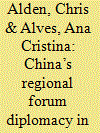

|
|
|
|
|
| Summary/Abstract |
This article examines Chinese-led regional forums in the developing world where the Chinese preponderance of economic power is self-evident, its financial largesse is readily utilised to sustain these endeavours, its bureaucracies are empowered to guide the conduct of institutional activities, and its normative intentions and interests are given fullest expression.
|
|
|
|
|
|
|
|
|
|
|
|
|
|
|
|
| 2 |
ID:
145908
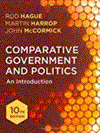

|
|
|
|
|
| Edition |
10th ed.
|
| Publication |
London, Palgrave, 2016.
|
| Description |
xv, 366p.pbk
|
| Standard Number |
9781137528360
|
|
|
|
|
|
|
|
|
|
|
|
Copies: C:1/I:0,R:0,Q:0
Circulation
| Accession# | Call# | Current Location | Status | Policy | Location |
| 058716 | 320.3/HAG 058716 | Main | On Shelf | General | |
|
|
|
|
| 3 |
ID:
156789
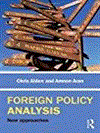

|
|
|
|
|
| Edition |
2nd ed.
|
| Publication |
Oxon, Routledge, 2017.
|
| Description |
ix, 186p.pbk
|
| Contents |
Includes bibliographical references and index.
|
| Standard Number |
9781138934290
|
|
|
|
|
|
|
|
|
|
|
|
Copies: C:1/I:0,R:0,Q:0
Circulation
| Accession# | Call# | Current Location | Status | Policy | Location |
| 059252 | 327.1/ALD 059252 | Main | On Shelf | General | |
|
|
|
|
| 4 |
ID:
121567


|
|
|
|
|
| Publication |
2013.
|
| Summary/Abstract |
SCHOLARS AND specialists often lament that once the United States commits itself to a course of action abroad, it rarely adjusts its path. Bureaucracies prize continuity over innovation and cling to the prevailing orthodoxy. Top officials often embrace positions predetermined by past prejudices and lessons. The gravitational pull of politics induces presidents and secretaries of state to persist with existing policies even when they aren't working. Although such inflexibility may not be particularly harmful in ordinary times, big problems can arise when the United States finds itself in uncharted territory or facing unexpected geopolitical shifts.
|
|
|
|
|
|
|
|
|
|
|
|
|
|
|
|
| 5 |
ID:
133481
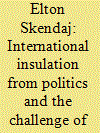

|
|
|
|
|
| Publication |
2014.
|
| Summary/Abstract |
Can international actors build effective state bureaucracies in postwar countries? While the literature on state institutions suggests they are best built under local ownership, this article shows how international actors in collaboration with local actors managed to build two effective state bureaucracies in postwar Kosovo: the police force and the customs service. Contrary to the article's Hypothesis 1 on local ownership, international actors insulated the effective bureaucracies from political and societal influences in order to prevent them from becoming sites of patronage. Thus, these institutions built on meritocratic recruitment and promotion. Employing a comparative research design, the article utilizes national survey data as well as data from 150 semistructured interviews conducted during ten months of fieldwork in Kosovo. By contrasting the state's constituent bureaucracies, which vary in effectiveness, and thus avoiding the reduction of the state to a unitary abstract actor, this research offers a fresh perspective on postwar state building. Furthermore, it contributes three innovative sets of indicators to measure effective bureaucracies: mission fulfillment, penalization of corruption, and responsiveness to the public.
|
|
|
|
|
|
|
|
|
|
|
|
|
|
|
|
| 6 |
ID:
113557
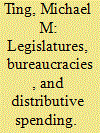

|
|
|
|
|
| Publication |
2012.
|
| Summary/Abstract |
This article develops a theory of bureaucratic influence on distributive politics. Although there exists a rich literature on the effects of institutions such as presidents, electoral systems, and bicameralism on government spending, the role of professional bureaucrats has yet to receive formal scrutiny. In the model, legislators bargain over the allocation of distributive benefits across districts. The legislature may either "politicize" a program by bargaining directly over pork and bypassing bureaucratic scrutiny, or "professionalize" it by letting a bureaucrat approve or reject project funding in each district according to an underlying quality standard. The model predicts that the legislature will professionalize when the expected program quality is high. However, politicization becomes more likely as the number of high-quality projects increases and under divided government. Further, more competent bureaucrats can encourage politicization if the expected program quality is low. Finally, politicized programs are larger than professionalized programs.
|
|
|
|
|
|
|
|
|
|
|
|
|
|
|
|
| 7 |
ID:
161363
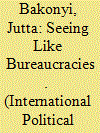

|
|
|
|
|
| Summary/Abstract |
Development promotes bureaucratization, and bureaucracies are based on knowledge and produce knowledge. Failures of development are therefore regularly attributed to a lack of knowledge. The article argues that the quest for knowledge is embedded in the managerial rationality of interventions. This rationality also structures the developmental knowledge field and thereby generates ignorance. The example of a state-building program in Somalia is used to empirically explore how the generation, administration, and transfer of knowledge was intertwined with ignorance. It shows what knowledge missed, obfuscated, ignored, or even hid and how knowledge and ignorance were arranged in the daily state-building practice. This approach sheds light on relations and mechanism of power exerted in development and helps to explain its effects. In Somalia, omission, silence, secrecy, and strategic and bureaucratic ignorance enabled the program to delineate the interventionist terrain as technical and to depoliticize state-building. They also helped to expand liberal modalities of government to “remote” and “unruly” Somali villages.
|
|
|
|
|
|
|
|
|
|
|
|
|
|
|
|
| 8 |
ID:
131689
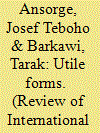

|
|
|
|
|
| Publication |
2014.
|
| Summary/Abstract |
This article introduces the concept of 'utile forms' and analyses the effects of these forms in imperial rule and contemporary counterinsurgency. Utile forms are media that enable bureaucracies to disseminate specialised knowledges to officials operating in the field. Examples include smart cards, field manuals, and handheld biometric devices. We argue that utile forms have significant social and political effects irrespective of the 'truth value' of the knowledge they contain. We analyse these effects in terms of world-ordering and world-making properties: utile forms both embody a particular worldview or ideology (world-ordering) and they facilitate official attempts to remake the world in accordance with this vision (world-making). We draw on examples of utile forms from British India and more recent conflicts in Iraq and Afghanistan. The article concludes by reflecting on the relations between truth, knowledge, and power in times of war and imperialism.
|
|
|
|
|
|
|
|
|
|
|
|
|
|
|
|
|
|
|
|
|